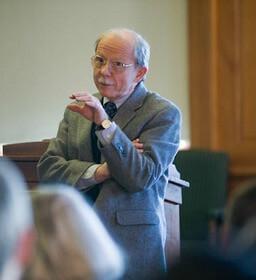Dean Cepeda-Benito recently announced that Wolfgang Mieder, Professor of German, has been awarded the rank of University Distinguished Professor. This recognition is reserved for up to ten of UVM’s most prominent faculty members in recognition of their outstanding disciplinary contributions. The rank of University Distinguished Professor is a career appointment and Wolfgang will become the eighth UVM faculty member to hold the title, the third one from CAS, and the first one representing the Humanities.
Says Cepeda-Benito, "Wolfgang is very deserving of this honor. Scholars attribute to him several seminal theoretical and applied contributions to his work on folklore and proverbs." Most recently, Wolfgang’s series on the rhetoric of heads of state and social leaders (e.g., The Proverbial Abraham Lincoln, 2000, and other proverbial book-length studies of Harry Truman, Martin Luther King, Winston Churchill, Charles Dickens, and Barack Obama) has transformed the minor genres of folklore into major evidence of worldview, consciousness, performance, practice, and social interaction in art, literature, politics, philosophy, and history. Scholars also credit Wolfgang with introducing the critical concept of the paremiological minimum (a minimal set of sayings, the learning of which is necessary for the understanding of any language, whether native or foreign). Here, Wolfgang went beyond the purely linguistic aspects of proverbial texts to establish the fact that for any text to qualify as a proverb, the text must have (or have had) some currency (broad and impactful use) for a substantial period of time, which in turn demonstrates the central role proverbs play in the formation and understanding of cultures (Paremiological Minimum and Cultural Literacy, 1995). There are other important contributions attributed to Wolfgang, including his coining the anti-proverb (Twisted Wisdom: Modern Anti-Proverbs, 1982), as well as Wolfgang’s seminal studies of the popular adaptation of classic fairy tales and his comparative historical expositions of legends and poems; and the list goes on. With over 200 books, 450 articles, 120 reviews, and 325 invited addresses worldwide, Wolfgang might well be the most prolific scholar on the planet.
In addition, to highlight his pre-eminence (i.e., Wolfgang is the first scholar to receive the three highest, most prestigious world-wide awards for folklore studies: the Pitrè International Folklore Prize, the Europäischer Märchenpreis, and the Lifetime Achievement Award from the American Folklore Society), Dean Cepeda-Benito says, "I want to conclude pointing out his day-to-day, year-after-year, consistent contributions. Note that Wolfgang achieved pre-eminence while being department chair for most of his career; while being a tremendous teacher and mentor to both students and colleagues; and while serving, contributing, and participating in shared governance and university life for the benefit of the Department of German and Russian, CAS, and UVM."
